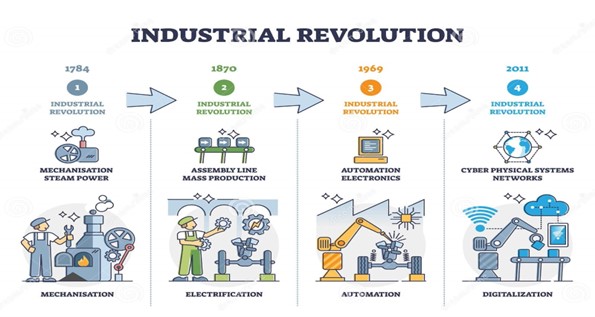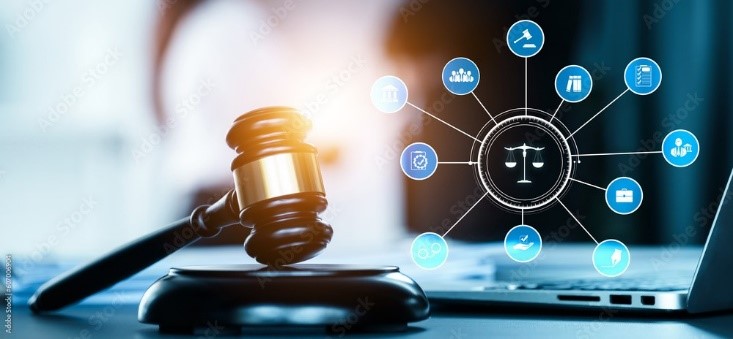The 4th Industrial Revolution & Technology in general. How both might apply to the Legal Profession.

What is the 4th Industrial Revolution?
The 4th Industrial Revolution (4IR) is the term used to describe the convergence of physical, digital, and biological technologies that are transforming the way we live, work, and communicate.The 4IR is characterised by the emergence of artificial intelligence, big data, cloud computing, blockchain, biotechnology, nanotechnology, robotics, and the Internet of Things. These technologies are creating new opportunities and challenges for various sectors, including the legal profession.
There is an urgent need to develop and apply complex cognitive skills to harness the opportunity of the 4IR, which is not just technology driven change, but impacts all industries, and represents an opportunity for everyone including leaders, policymakers and humans from all income groups and nationalities to adopt converging technologies to create a sustainable inclusive future for all humans. To achieve that people who already have critical cognitive skills will be in high demand to help shape a sustainable future and deliver the prediction of the 4IR.
Why are lawyers’ skills relevant for the 4th Industrial Revolution?
The 4IR will require lawyers to help their clients, regulators, and community to navigate the digital world. The skills that lawyers have traditionally developed, such as critical thinking, problem-solving, knowledge of the current law, communication, research, analysis, and ethics, will be highly sought after and key skills named as critical skills that are needed in the 4IR. Lawyers are trained to deal with complex, uncertain, and ambiguous situations, to evaluate evidence and arguments, to apply rules and principles, and to balance competing interests and values. These skills will enable lawyers to navigate the ethical, legal, and social implications of the 4IR, and to provide effective and innovative solutions for their clients.
How can technology in a firm augment lawyers’ work?
Technology can be a powerful ally for lawyers in the 4IR, as it can augment their work by automating tactical workflows and removing otherwise manual and administrative tasks. Technology can help lawyers to easily access and analyse large amounts of data, to generate and review contracts and documents, to conduct due diligence and research, to manage projects and tasks, and to communicate and collaborate with clients and colleagues. Technology can also enhance lawyers’ creativity, productivity, and efficiency, as well as their access to new markets and clients.
Technology can free lawyers from the mundane and repetitive aspects of their work and allow them to focus on the higher value and more strategic aspects, such as advising, negotiating, litigating, and advocating.
There are many workflows in a legal practice which can be easily transformed to a digital process and in the process deliver many benefits which are aligned to the promise of IR.
Such as a more productive and better use of an individual lawyer’s time, which creates purpose, gives back time to spend on wellbeing or higher value legal work.
There is a great opportunity for lawyers to look honestly at the manual processes with their firm, truly uncover employees hidden needs and where time consuming and error prone workflows exists that are manual with the view to consider how technology can assist them to make working hours more productive.
What are the challenges and opportunities for lawyers in the 4IR?
The 4IR will pose some challenges but also many opportunities for lawyers.
Lawyers and Firms will need to keep up with the rapid pace of change, to learn to transition tasks to technology and understand the available tools, to embrace new ways of working, and to cope with the uncertainty and complexity of the 4IR opportunities that are perhaps not that clear or obvious now.
Lawyers will need to be flexible, adaptable, and resilient, as well as curious, open-minded, and collaborative around technology, and develop digital skills.
Lawyers will have many opportunities to leverage their human and emotional intelligence to provide value and differentiation for their clients and employers. Lawyers will also be proactive, innovative, and entrepreneurial, as their clients will face new competitors, new business models, and new legal issues in the 4IR.
The 4IR will transform how we all work live and aspects of the legal profession, Lawyers who are willing and able to embrace technology and develop new skills and consider their clients legal challenges in the digital age, will thrive in the 4IR, as they will be able to provide more value, quality, and impact for their clients and the community.




